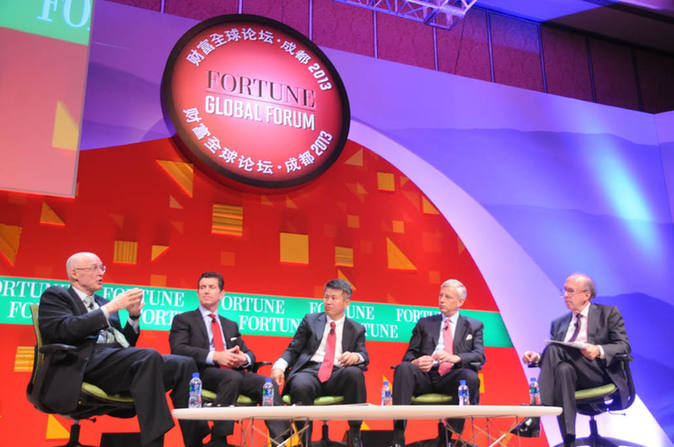China’s Comprehensive Advantages in Attracting Foreign Investment
By staff reporter JIAO FENG
On March 5, 2014, Premier Li Keqiang delivered the government work report, which promises to initiate a new phase of openness and high performance. The government will foster a new open-economy system and advance a new round of opening up to embrace the international market. The government will also open China to the outside world in all areas. Further, the report promises to level the playing field for domestic and foreign enterprises so as to ensure that China remains a top choice for foreign investment.
Some market participants believe that, along with China’s rapid and steady economic development, expanding consumer market, and better law and policy environment, China maintains a comprehensive advantage in absorbing foreign capital.
Irreplaceable Advantage
Since the reform and opening-up, China’s economic development has drawn attention from investors worldwide. During the past two decades, China has the largest scale in actual use of foreign investment among developing countries. In 2012, China surpassed the U.S. to become the first choice of foreign direct investment (FDI).
Currently, China is confronted with economic pressures from structural adjustment and industrial upgrading, making it imperative to close down outdated production facilities. Meanwhile, China’s demographic dividend has passed a critical point, causing labor costs to increase and reducing China’s competitive edge in this regard. Nevertheless, China has maintained sustainable growth in attracting foreign investment.
In 2013, foreign investment in China picked up steadily, maintaining a positive growth for 11 consecutive months since February. China’s 2013 actual use of foreign investment was US $117.586 billion, up by 5.25 percent year on year.
“The advantage lies in China’s tremendous market and integrated industrial chain,” said Zhang Xiaoji, director of the Foreign Economic Relations Department of the Development Research Center of the State Council.
According to Zhang, whereas overseas-funded enterprises used to value China for its abundant labor force, they now value its market. The biggest draw is its market size, rather than low costs. Thanks to China’s rapid development and rising incomes, overall domestic demand continues to increase. Consequently, investors worldwide are optimistic about China’s market. Although China’s labor cost is higher than that of other countries in Southeast Asia, China has an edge in scale: this advantage in mass production is difficult to replace. Meanwhile, usually China has many interrelated manufacturing enterprises within an industrial cluster that form a complete industrial chain. This is rare in other countries. Because China has high combined efficiency, foreign investors have been reluctant to pull out of China.
Fields That Open Wider
During the past 30-odd years, Chinese manufacturing has become far more competitive. Benefiting from comprehensive and intensive policies to open manufacturing, China has become the world’s largest exporter of manufactured goods. By contrast, the country’s service industries are lagging behind. In November 2013, the Third Plenary Session of the 18th CPC Central Committee approved a decision to open up the fields of finance, education, culture, healthcare and other service sectors. The decision promises to lift limits on foreign investment in home care, architectural design, accounting and auditing, trade and logistics, electronic commerce and other service sectors, and further liberalize general manufacturing.
According to Zhang Xiaoji, the service industry is the most relevant concern to overseas-funded enterprises. Manufacturing also has room to open up further, as some sectors remain inaccessible to foreign capital.
China (Shanghai) Pilot Free Trade Zone was officially launched in September 2013, with six service sectors open to foreign capital: finance, shipping, commerce, culture, social and professional services. The highly-anticipated zone will, for the first time, pilot a negative list management mode and pre-establishment national treatment. The new free trade zone is significant in that it is intended to hasten the transformation of government functions, expand the opening of investment fields, and encourage financial innovations.
According to Zhang Xiaoji, foreign-funded enterprises must secure government approval to enter China, as prescribed by Chinese law. The free trade zone represents a major experiment in economic reform. Some of the reforms in the zone include convertible RMB capital accounts and a financial service sector open to eligible private capital and foreign financial institutions. The zone will accumulate experience for China further opening its growing service industry and push the shift from government examination and approval system to a filing system. The ultimate object of the free trade zone is to develop an internationally competitive capital management system.
Moreover, China is building a fair business environment bolstered by the rule of law. During the 2013 APEC CEO Summit in Bali, Indonesia, Chinese President Xi Jinping vowed to implement a more proactive opening strategy, and perfect laws and regulations to create a fair legal environment for foreign enterprises in China.

A discussion at the 2013 Fortune Global Forum in Chengdu, capital of Sichuan Province, on China’s changing economic pattern.
